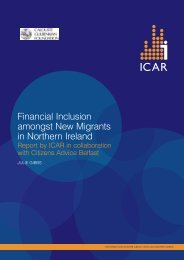Uncovered: assessing media and communications needs ... - ICAR
Uncovered: assessing media and communications needs ... - ICAR
Uncovered: assessing media and communications needs ... - ICAR
- No tags were found...
Create successful ePaper yourself
Turn your PDF publications into a flip-book with our unique Google optimized e-Paper software.
Fig 9.Individuals across all sectors reported a heavy reliance on informal contacts or family members inhelping overcoming <strong>media</strong> skills shortages. This was reported particularly amongst BME individuals<strong>and</strong> people living in rural areas. The former are said to be likely to pay £50 for one-off assistance indesigning a website, while retired IT, design or <strong>media</strong> experts are much in dem<strong>and</strong> in rural areas.3.14 Available resources for <strong>media</strong>/<strong>communications</strong> trainingAs found in relation to organisational resources, refugee <strong>and</strong> migrant groups have the least resourcesavailable to fi nance <strong>media</strong> <strong>and</strong> <strong>communications</strong> training, while those responding as ‘isolated rural’have the most. However those with funds available may be rural infrastructure organisations;responses from participants in the rural focus group <strong>and</strong> interviewees from isolated rural areas weremore in line with groups from other sectors, with little funding available for such courses.Signifi cantly, most organisations surveyed reported that they do not have the resources to pay fortraining. This may be because they do not think it is important enough to prioritise when drawing upbudgets <strong>and</strong> may have implications for the way Media Trust market <strong>and</strong> promote its courses. It alsosuggests there is a need for awareness-raising among these groups about the relevance of <strong>media</strong> <strong>and</strong><strong>communications</strong> to other aspects of their work, for example in raising funds <strong>and</strong> attracting volunteers<strong>and</strong> clients.At national level, interviewees reported a greater interest in training. Some, particularly in faith <strong>and</strong>BME organisations, have received Media Trust training <strong>and</strong> spoke highly of it.“Voluntary organisations tend to be traditional in setting budgets. But even within their limitedresources if they understood the importance of the <strong>media</strong> they could include it when planning theirfi nances” – (civil servant)3.15 Access to the internetAll faith <strong>and</strong> isolated rural groups that responded to the survey <strong>and</strong> the vast majority of all respondentshave access to email <strong>and</strong> the internet (only a few BME, refugee <strong>and</strong> migrants do not) <strong>and</strong> only slightlyfewer to broadb<strong>and</strong>. This illustrates how crucial the internet is as a means of communication. The factthat fewer refugees <strong>and</strong> migrant workers (only 76.7%) said they had a direct broadb<strong>and</strong> connectionmay be attributable to individual respondents whose living conditions are likely to be less permanent.<strong>Uncovered</strong>: <strong>assessing</strong> <strong>media</strong> <strong>and</strong> <strong>communications</strong> <strong>needs</strong> <strong>and</strong> capacity of marginalised communities27
















